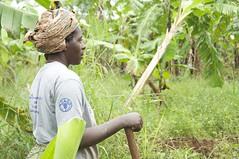Fuel-efficient stoves are keeping women safer in Nigeria
Locally-made stoves reduce the health and safety risks for women and girls.

©FAO/Ny You
There is a great need for fuel and energy for cooking and other domestic activities in many households in northeastern Nigeria, where traditional cooking methods can put women, in particular, in perilous situations. To support families who urgently require sustainable access to fuel and energy, FAO has been distributing fuel-efficient stoves in Borno, home to the region’s largest IDP population. About 5 000 stoves have been supplied to families (one per household) in 10 locations since May, with 6 000 more planned by the end of the year - reaching an estimated 11 000 families in 2018.
Thanks to this initiative, women like Mallama Abubakar, a resident of the Bakassi camp for Internally Displaced Persons (IDPs) in Maiduguri, Borno State, are able to replace their old, traditional stoves with new, fuel-efficient ones.
“We are happy to get rid of the Murfu, ’’ said Mallama, referring to the Hausa name for the traditional method of cooking on three or more large stones, propped up with heavy pieces of firewood. ‘‘It is making many of us women sick, especially in the chest and eyes,’’ she added, motioning emphatically to her lungs. ‘‘The smoke affects our babies too because we sometimes tend to them as we cook. When we are breastfeeding, smoke enters their eyes and mouths.’’ According to Nigeria’s Ministry of Health, respiratory illnesses caused by smoke inhalation are the third highest cause of death in the country.
The search for firewood can also be dangerous. A gender-specific activity in much of northeastern Nigeria, firewood collection is usually tasked to women and girls.
‘‘The security officers try to stop us when we go to the bush to search for firewood,’’ said Awah Ahmed, also a resident of Bakassi. ‘‘When you go into the bush you can easily be attacked by Boko Haram. They can take your money, rape or kill you. So we fear going into the bush for wood.’’
The new stoves lessen the demand for firewood by 65 percent, and reduce the need for women and girls to look for fuel and energy in unsafe and insecure places, thereby decreasing their risk of facing gender-based violence beyond the camps.
